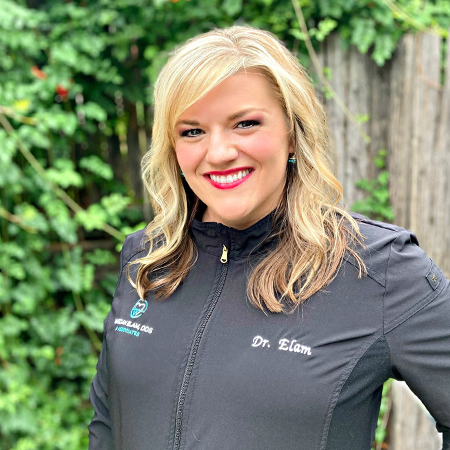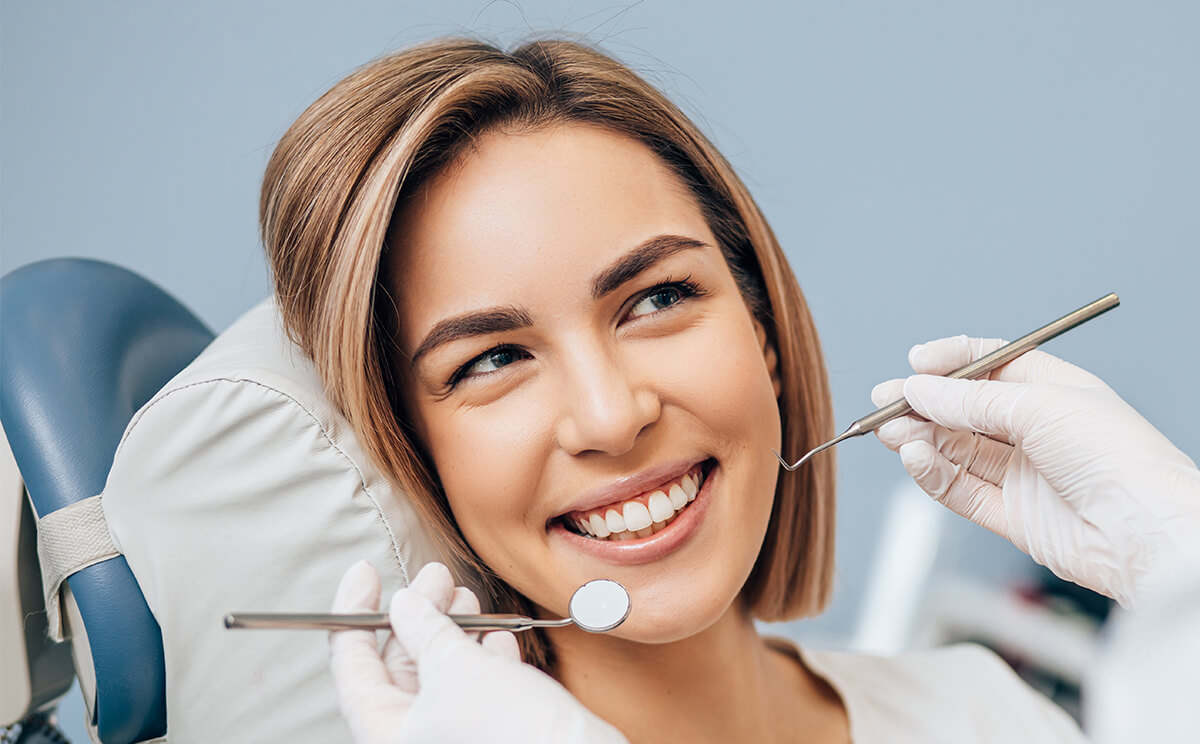Oral Cancer Screenings – Bedford, TX
Detecting Problems Today To Protect You In The Future
Sadly, oral cancer is a problem that can affect anyone, not just those who use tobacco. 25 percent of oral cancer cases won’t involve lifestyle risks like tobacco use.
Dentists are a vital part of the fight against cancer, often catching an estimated 84 percent of oral cancers before they progress to more advanced, harder-to-treat stages. That’s why, at Maegan Elam, DDS & Associates, Bedford, TX, dentist, Dr. Maegan Elam, offers oral cancer screenings as part of every dental exam. Schedule your oral cancer screening by calling our northeastern Tarrant County practice at (817) 283-2871.
What is Oral Cancer?

Oral cancer or oral cavity and oropharyngeal cancer, is a type of cancer that develops in the tissues of the mouth or throat. It can occur on the lips, gums, tongue, roof or floor of the mouth, or inner lining of the cheeks. According to the American Cancer Society, an estimated 58,450 new cases of oral cavity or oropharyngeal cancers will be diagnosed in 2024.
Signs And Symptoms Of Oral Cancer

Common signs of oral cancer include:
Persistent mouth sore or ulcer that doesn’t heal
Red or white patches on the gums, tongue, or lining of the mouth
Swelling, lumps, or thickening of the mouth tissues
Difficulty chewing, swallowing, or speaking
Chronic sore throat or hoarseness
Numbness or pain in the mouth or lips
Changes in the fit of full or partial dentures or teeth alignment
Risk Factors For Oral Cancers

Some of the most common risk factors for oral and oropharyngeal cancers include the following:
Tobacco Use: This is the single biggest risk factor for oral cancer. Tobacco use in any form, including cigarettes, cigars, pipes, chewing tobacco, and snuff, can irritate the mouth and throat. These irritants can damage the cells in your mouth, leading to cancer.
Alcohol Consumption: Heavy alcohol consumption can damage the cells in your mouth and throat, making them more likely to become cancerous. The risk is even higher for people who both smoke and drink alcohol. Alcohol weakens the body’s immune system, making it harder to fight off HPV infection, another risk factor for oral cancer.
Human Papillomavirus (HPV) Infection: Certain strains of HPV, the virus that causes genital warts, can also cause oral cancer. HPV is spread through oral sex. The risk of HPV-positive oral cancer has been increasing in recent years, especially among young adults.
Diet: A diet low in fruits and vegetables and high in processed foods may increase your risk of oral cancer. Fruits and vegetables contain vitamins and antioxidants that can help protect your cells from damage.
Sun Exposure: Ultraviolet (UV) light exposure can increase your risk of lip cancer. People with fair skin are at a higher risk.
Poor Oral Hygiene: Poor oral hygiene, such as not brushing and flossing your teeth regularly, can increase your risk of gum disease. While gum disease isn’t a cause of oral cancer, it can irritate the mouth and make it more difficult to detect oral cancer early.
Weakened Immune System: People with weakened immune systems, such as those with HIV/AIDS or people undergoing organ transplantation, are at an increased risk of oral cancer.
What Are Oral Cancer Screenings?

Oral cancer screenings are quick, painless examinations performed to visually inspect the mouth, lips, tongue, and throat for early signs of oral cancer. These screenings are crucial for early detection, which can greatly improve treatment outcomes and chances of survival.
Benefits of Oral Cancer Screenings

Early Detection: Oral cancer screenings allow for the early identification of abnormal changes or potential cancer before symptoms appear. Early detection is crucial, as it significantly improves treatment outcomes and chances of survival.
Improved Survival Rates: People diagnosed with early-stage oral cancers have much higher five-year survival rates compared to those diagnosed with late-stage disease. five-year survival rates are over 80 percent for early-stage oral cancers but drop to under 30 percent for late-stage diagnoses.
Reduced Treatment Needs: When caught early, oral cancers are often more treatable and may require less invasive, disfiguring, or intensive treatments. Early-stage oral cancers can frequently be treated with surgery alone or in combination with radiation therapy.
Expanded Treatment Options: With early detection, patients can access a broader range of treatment options that may be less harmful to their quality of life. Advanced oral cancers often limit treatment choices and can require more aggressive procedures.
Peace of Mind: Regular oral cancer screenings can provide reassurance and peace of mind about their oral health. Screenings help identify any concerning changes early before they become problematic.
Low-Cost Prevention: Oral cancer screenings are a relatively inexpensive preventive dentistry measure that can save significant costs associated with late-stage cancer treatments. Screenings are typically covered by most dental and medical insurance plans.
Tools & Techniques for Oral Cancer Screenings

Common tools and methods used during oral cancer screenings include the following:
Visual and Manual Examination: Visual inspection of the entire oral cavity, including the lips, cheeks, gums, tongue, and floor of the mouth. Palpation (feeling) of the lymph nodes in the neck and jaw area to check for any abnormal swelling or lumps.
Illumination and Magnification: Specialized lighting and magnifying devices can closely examine the oral tissues. This can help identify subtle changes or discolorations that may be difficult to see with the naked eye.
Dye-Based Staining: Application of a special blue dye to the oral tissues. The dye highlights abnormal cells or precancerous changes, making them more visible.
Oral Cancer Screening Devices: Specialized handheld devices that use different light wavelengths or other technologies to detect oral abnormalities. Examples include chemiluminescence, autofluorescence, and direct tissue imaging devices.
Biopsies: If any suspicious lesions or changes are found, your dentist or doctor may perform a biopsy. A small tissue sample is taken and analyzed under a microscope to check for cancerous or precancerous cells.
The Oral Cancer Screening Process

Consultation
Before your oral cancer screening, you’ll have an initial consultation with Dr. Maegan, your Bedford dentist. During your initial consultation, Dr. Elam will discuss your medical history, any cancer risk factors, and any concerns you may have. She’ll explain the importance of oral cancer screenings and answer any questions.
Preparation
No special preparation is typically required for an oral cancer screening test. However, avoid consuming food or beverages that may stain your mouth for a few hours before the oral cancer screening tests.
Oral Cancer Screening
The oral cancer screening begins with a thorough visual examination of your mouth, lips, tongue soft palate, and throat. Dr. Elam will look for any abnormalities, such as red or white patches, lumps, or irregularities in the tissue. She may also use specialized tools like oral cancer screening dye with an oral cancer screening light to aid in the detection of any suspicious areas.
If any abnormalities or abnormal tissue are found, Dr. Elam may recommend a biopsy or further testing to determine the nature of the lesion. If the cells are determined to be cancerous, she’ll recommend you to a specialist for appropriate treatment.
Frequently Asked Questions
Are oral cancer screenings accurate?
Oral cancer screenings are generally accurate but not perfect. Occasionally, they may give false results due to various factors such as the skill of the healthcare provider or other conditions affecting the mouth. Despite this, regular oral cavity cancer screenings are still highly valuable for catching potential issues early and improving patient outcomes.
Are oral cancer screenings covered by insurance?
Whether oral cancer screenings are covered by insurance depends on your specific insurance plan, but many plans cover them as part of preventive care. It’s best to check with your insurance provider to confirm coverage.
How often should I have an oral cancer screening?
It’s ideal to have oral cancer screenings annually, especially if you have risk factors such as tobacco use, heavy alcohol consumption, or a history of oral cancer in your family. Regular screenings can help detect oral cancer in the early stages when treatment is most effective.
Are oral cancer screenings painful?
No, oral cancer screenings are non-invasive and generally pain-free. The process involves a visual examination and may include special dyes or lights, but there shouldn’t be discomfort.
Don’t Take Chances With Your Oral Health – Get Screened Today!
Oral cancer is a serious threat that can affect anyone, regardless of lifestyle factors. But the good news is that regular oral cancer screenings can help catch it early when treatment is most effective. So don’t delay – schedule your appointment at Maegan Elam, DDS & Associates by calling (817) 283-2871 and take the first step towards protecting your long-term oral health and wellbeing. We proudly serve new and returning patients from Bedford, Hurst, Colleyville, Euless, TX, and the surrounding areas.





